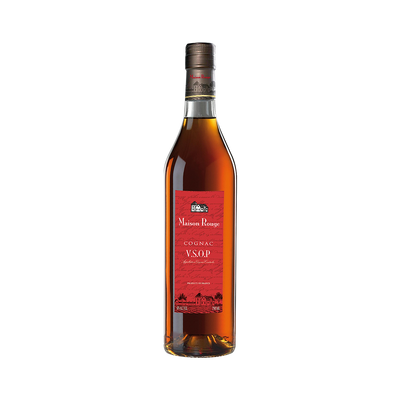VSOP Cognac
What is VSOP Cognac?
VSOP Cognac is a specific grade of Cognac that must be aged for a minimum of four years, with the youngest eau-de-vie in the blend meeting this requirement. The letters stand for "Very Superior Old Pale," a classification system that dates back to a request from the future King George IV of England in 1817. This aging category sits between VS (Very Special) and XO (Extra Old) in the Cognac hierarchy, offering more complexity and depth than younger expressions while remaining more accessible than the premium aged bottlings.
Learn More About VSOP Cognac
What makes VSOP Cognac unique?
VSOP Cognac stands apart with its mandatory four-year minimum aging requirement, creating a sweet spot between the youthful VS expressions and the more mature XO bottlings that delivers refined complexity without the hefty price tag. Unlike Armagnac, which can be distilled once in column stills and sourced from a broader geographic area, VSOP Cognac must undergo double distillation in copper pot stills within the specific Cognac region, resulting in a more delicate and nuanced spirit. This aging category particularly shines because it captures the essence of Cognac's terroir while allowing the oak influence to develop sophisticated vanilla and spice notes that younger expressions simply can't achieve.
How is VSOP Cognac made?
VSOP Cognac starts with white wine grapes grown in the Cognac region of France, which are fermented and then double-distilled in traditional copper pot stills called alembics to create a clear eau-de-vie. This spirit is then aged in French oak barrels for a minimum of four years, with the master blender combining eaux-de-vie of different ages and vineyard origins to create the final product. The "Very Superior Old Pale" designation means every drop in the bottle has spent at least four years developing those signature vanilla, spice, and dried fruit notes that come from the oak aging process.
How do you drink VSOP Cognac?
VSOP Cognac shines brightest when sipped neat at room temperature from a snifter or tulip glass, allowing you to appreciate its complex fruit and oak notes that develop from at least four years of aging. While purists prefer it straight, VSOP also works beautifully on the rocks or in classic cocktails like the Sidecar, Cognac Old Fashioned, or French Connection, where its refined character can stand up to other premium ingredients. This sophisticated spirit pairs perfectly with cooler weather and special occasions—think fireside evenings, holiday celebrations, or intimate dinner parties where conversation flows as smoothly as the amber liquid in your glass.
How do I choose good VSOP Cognac?
When selecting a VSOP Cognac, look for producers from the Grande Champagne or Petite Champagne regions, which offer the most refined and age-worthy expressions, then taste for a balance between fruity elegance and oak complexity without harsh burn. For sipping neat, lean toward brands like Hennessy or Rémy Martin that showcase smooth, honeyed notes, while cocktail mixing calls for slightly more robust options like Martell or Courvoisier that won't disappear behind citrus and sweeteners. Your budget matters too—entry-level VSOP bottles around $40-50 often provide excellent value, but stepping up to $60-80 range typically rewards you with noticeably smoother, more nuanced spirits worth the extra investment.
Nutritional Information
Typical Calorie Range per Ounce: 65-70 calories
Typical Carbohydrate Range per Ounce: 0-0.1 grams
Typical Sugar Range per Ounce: 0-0.1 grams
Typically Gluten Free: Yes
VSOP Cognac is distilled from grapes and aged in oak barrels, making it naturally gluten-free since it contains no wheat, barley, rye, or other gluten-containing grains. The distillation process removes virtually all carbohydrates and sugars, leaving behind pure alcohol and the complex flavors developed during aging. While most cognacs are gluten-free, we recommend checking the specific product label or contacting the manufacturer directly to confirm gluten-free status, especially if you have celiac disease or severe gluten sensitivity, as some brands may use additives or processing methods that could introduce gluten.
Scrolled this far? Your reward? VSOP Cognac Trivia!
- VSOP was invented for a future king of England. In 1817, Hennessy created "Very Superior Old Pale" specifically for the Prince Regent (later King George IV), who wanted his cognac light in color but rich in flavor. The term stuck, and now every cognac house uses VSOP to mean aged at least four years. Talk about royal influence on your liquor cabinet!
- The "Pale" in VSOP doesn't mean weak—it means expensive. Back in the day, darker cognacs were considered lower quality because they picked up too much color from cheap wood or added caramel. The palest cognacs came from the finest, well-seasoned Limousin oak barrels that cost a fortune. So "pale" actually meant "we spared no expense on proper aging."
- VSOP cognac must legally disappear for at least 1,460 days. French law requires the youngest eau-de-vie in a VSOP blend to age minimum four years in oak. That's 1,460 days of angels taking their share (about 2% evaporates annually). By the time you sip it, roughly 8% of the original spirit has literally vanished into thin air.
- Master blenders can identify over 1,200 different flavor compounds in VSOP. While wine experts might detect 400-500 compounds, cognac's double distillation and oak aging creates an incredibly complex flavor matrix. Professional tasters spend decades learning to distinguish between eaux-de-vie from different vineyards, distillation dates, and barrel types—all by nose and palate alone.
- The water used to proof VSOP comes from a 1,000-year-old recipe. Most cognac houses use water from specific local springs that's been demineralized using traditional methods passed down through generations. Some producers still use the exact same water sources their founders used centuries ago, claiming the mineral profile is crucial to their signature taste profile.
Higher-proof spirits can be intense. Mix carefully, taste thoughtfully, and enjoy responsibly.
Gift message (optional)

